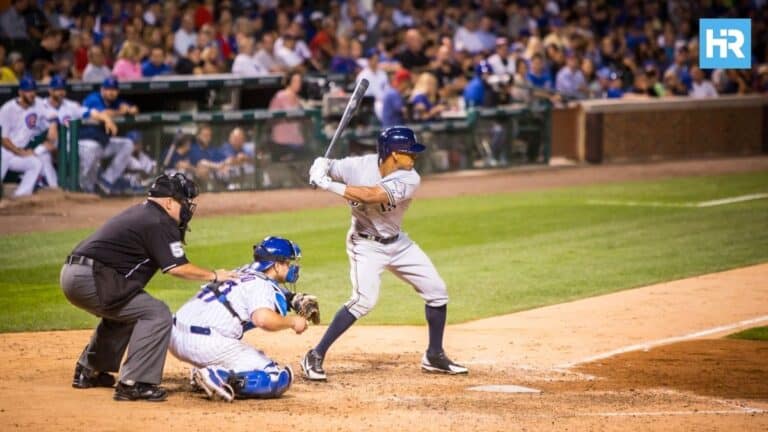
Major League Baseball (MLB) has produced countless legends and unforgettable moments—but not every player earns fame for greatness. While stars rise through record-breaking feats, others are etched in history for costly mistakes and disappointing stats.
This article explores the careers of the most notorious players in MLB history, highlighting those whose time in the majors was defined by struggles, failures, and missed opportunities instead of triumph.
- Steve Jeltz’s low career batting average and few home runs limited his effectiveness as a player.
- Kevin Jarvis struggled as a pitcher, particularly with a high earned run average and a tendency to allow too many home runs.
- Tommy Thevenow experienced a significant drought in hitting home runs, which lasted most of his career.
10 Worst Baseball Players
Let’s take a closer look at these players who, despite their best efforts, ended up making history for all the wrong reasons. Here are the ten most memorable underperformers in MLB history.
1. Bill Bergen
MLB is full of memorable and iconic moments, but there have been many underperformers who have left their mark on the sport — Bill Bergen being one of the most notable.
Bill Bergen, who played from 1901 to 1911, is often highlighted for his exceptionally low batting average of .170, the worst among major leaguers with over 2,500 at-bats.
Despite being a superb defensive catcher, his offensive capabilities were severely lacking. In 1909, he set a record of 45 consecutive at-bats without a hit, which stood for 102 years.
Bergen’s defense was highly regarded. He often ranked among the best catchers of his time in terms of assists and fielding percentage.
2. Mario Mendoza
Mario Mendoza, known for the “Mendoza Line,” a term used to describe a batting average below .200, played from 1974 to 1982.
Despite being a solid defensive player, his batting average was often below this threshold, finishing his career with a .215 average.
The term “Mendoza Line” was popularized in the late 1970s by his teammates and caught on in the media, symbolizing poor hitting.
Mendoza’s struggles at the plate made him a frequent subject of discussion when talking about underperforming hitters.
3. Al Chambers
Al Chambers, the first overall pick in the 1979 MLB Draft by the Seattle Mariners, endured a short and disappointing major league career, appearing in just 57 games between 1983 and 1985.
He finished his stint in the big leagues with a .208 batting average and only two home runs.
Chambers often reflected that he never received a true opportunity to prove himself at the MLB level, a frustration he voiced in interviews after retirement. His limited chances and minimal impact make his career one of the most notable busts for a number-one draft pick.
While MLB legends are celebrated for their lasting impact, it’s equally important to revisit players like Al Chambers, whose careers highlight the harsh realities of missed opportunities in professional baseball.
4. Jim Levey
Jim Levey’s career with the St. Louis Browns in the early 1930s is infamous for setting the record for the worst single-season Wins Above Replacement (WAR) in MLB history at -4.0.
Over his 440-game career, Levey had a batting average of .230 and managed to hit 11 home runs, but his performance got noticeably worse over time.
5. Bob Uecker
Bob Uecker, widely celebrated for his broadcasting career, had a less successful time as a player.
With a WAR of -1.0 and a batting average of .200 across 297 games, Uecker’s performance behind the plate did not mirror his subsequent success in the commentary box.
His time in the MLB was marked by his humor and self-deprecating commentary, which later defined his broadcasting style.
Uecker’s legacy in baseball is enriched by his humorous take on his playing days, often joking about his on-field struggles.
6. John Gochnaur
John Gochnaur’s career as a shortstop from 1901 to 1903 is marked by his extremely poor batting average of .187 and his defensive record, which included a staggering number of errors.
Over three seasons, he committed 146 errors and never hit a home run across 264 games. Gochnaur’s 1903 season with the Cleveland Naps is particularly infamous, during which he made 98 errors.
This unfortunate record contributes significantly to his reputation as one of the worst MLB players of all time.
7. Steve Jeltz
Steve Jeltz’s MLB career lasted from 1983 to 1990. During this time, he was known for his low batting average of .210 and minimal power, evidenced by just five home runs in over 1,700 at-bats.
His on-base percentage was relatively better at .308 due to his higher walk rate. Jeltz’s notable career moment was a two-homer game in 1989, a rarity given his overall power shortage.
Despite a long career, his offensive struggles and a negative overall WAR reflect his difficulties maintaining consistent performance at the major league level.
8. Kevin Jarvis
Kevin Jarvis, a pitcher whose MLB career lasted from 1994 to 2006, struggled with a high ERA of 6.03 over 780 innings.
His challenges on the mound were compounded by giving up many home runs and recording more losses than wins, which made his tenure as a pitcher tough.
These issues highlight Jarvis’s difficulties in finding consistent success in his roles.
9. Tommy Thevenow
Tommy Thevenow played as a shortstop in the 1920s and 1930s and is well-known for his extremely long home run drought.
After hitting three inside-the-park home runs in 1926, he never hit another over his career, spanning 3,614 plate appearances.
Despite this lack of power, Thevenow was kept in lineups primarily for his defensive skills, although injuries later hindered his career.
10. Ralph “Putsy” Caballero
Putsy Caballero’s career lasted from 1944 to 1952. During this time, he recorded a batting average of .228 and minimal power, which contributed to his WAR of -2.5.
Known for being one of the youngest players in MLB history to appear at third base, Caballero’s career was marked by his youth but limited impact on the field.
His involvement in the 1950 World Series and various clutch pinch-hitting appearances were highlights of his otherwise underwhelming career.
In summary, these players’ stories remind us how tough professional baseball can be. Not every player becomes a star, but each adds something unique to the history of Major League Baseball.
Their careers are full of personal challenges and moments where they had to keep trying, showing us how unpredictable and tough the sport can be.
Whether they’re known for not hitting many home runs or having trouble pitching, these players show the real challenges athletes face in the intense world of baseball.
Lessons to Learn from Baseball’s Underperformers
While some players hit it big and end up scoring lucrative MLB salaries, this list reminds us of the relentless unpredictability and the rigorous demands of pro baseball, which leads to some disappointing careers.
Remembered more for failures than triumphs, these players have still carved out a unique spot in MLB history.
From Bill Bergen’s strong defense overshadowed by his poor batting to Putsy Caballero’s fleeting moments of promise in an otherwise quiet career, each case highlights the unforgiving challenges and setbacks that define life in the big leagues.









